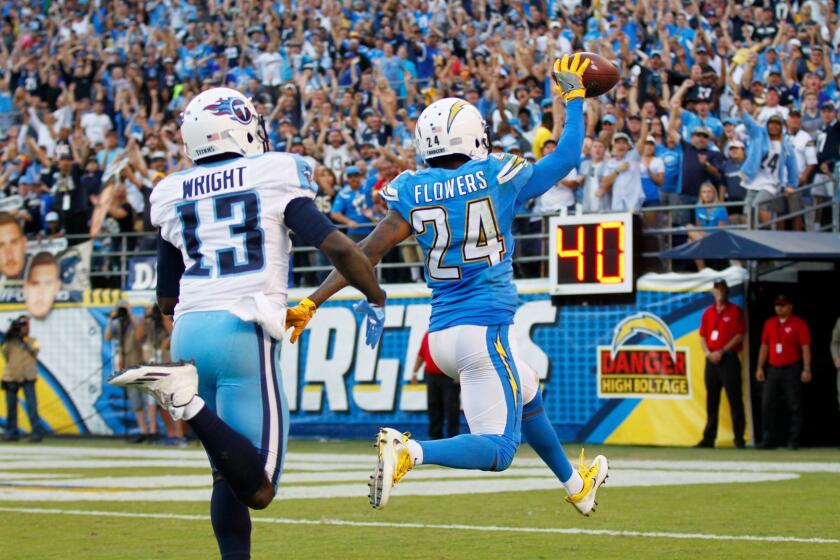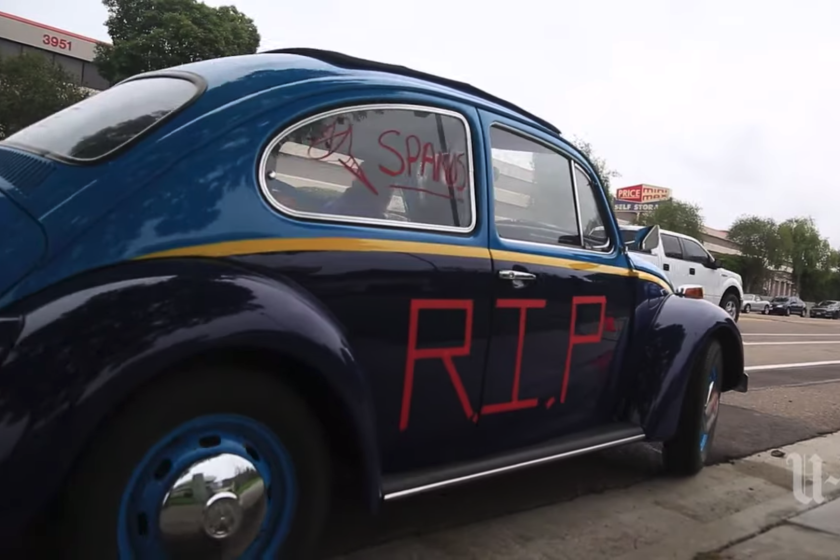Offense missing Danny Woodhead
It was unreal, really.
The first four games the Chargers were without running back Danny Woodhead, they converted 66.7 percent of third downs. Quarterback Philip Rivers threw eight third-down touchdowns; he had nine each of the previous two years, for comparison.
The receiving corps was clinical. The pass protection held.
Those runs are great when they come, but they do not last.
The impact of losing Woodhead took a few weeks to settle in this season. For the past four games, it’s surfaced. The Chargers offense has been in a rut, the size of which is partly explained by a missing dimension. San Diego must compensate somehow Sunday against an aggressive Rams defense.
Woodhead is not coming back.
The veteran who can run a full route tree out of the backfield as well as any player in the league is out for the season with a fractured fibula. There is no replacing a weapon like that.
Minimizing the loss, finding another way is the challenge.
In the four games since that four-week stretch, the Chargers have converted 14 of 46, or 30.4 percent, of third downs. Rivers has no third-down touchdowns. He’s been efficient, but all in all, the explosive plays haven’t been there, the opposing pass rush has been, and the execution in the receiving corps has fallen short at critical times.
San Diego, with 13 points in eight quarters, has found the end zone once since Oct. 23
Woodhead caught 76 of 87 passes in 2013 for 605 yards and six touchdowns.
He is not coming back.
“I think it’s our jobs as coaches to do what our players do best,” coach Mike McCoy said. “We’re fortunate we have other good players on our team. It’s Frank’s job (offensive coordinator Frank Reich) and Ollie’s job (running backs coach Ollie Wilson) to put those guys in a position to succeed. Injuries are all a part of the game. You can’t worry about that. You move on.”
McCoy is right. He’s gone.
But while Woodhead’s absence is no excuse for a lack of production, it is important, especially on a day like Sunday, to acknowledge the challenge presented.
Teams wave off injuries, but there is a reason they pour resources into strength and conditioning, into athletic training, into cold tubs and hot tubs and swimming pools and stretching: Health is important.
Teams wave off losing personnel, but there is a reason Woodhead was signed to a two-year contract in 2013, why he was considered so integral to offense’s success last season, why he was given in July a two-year extension: He is important.
To McCoy’s point, the Chargers must and are moving on.
Woodhead gave Rivers a safety net that, at times, off-set pressure. Woodhead is gone, but the opposing rush remains.
Even a most inspired effort from the Chargers offensive line is unlikely to totally negate what defensive ends Robert Quinn and William Hayes bring off the edge or the disruption rookie defensive tackle Aaron Donald is capable of providing.
Quicker passes help. A run game helps. Stops on defense, be them takeaways that create sudden-change opportunities or simply field position, certainly help.
The Chargers have won without Woodhead this season.
Running back Ryan Mathews is healthy, this his second game heading a three-deep attack. The defense is playing fast with an established rotation in the front seven.
Valuable as he is, there are enough weapons to move the ball without Woodhead.
“It’s a two-fold deal,” Rivers said. “We feel confident in the guys who are in there, whether it’s Ryan or Donald (Brown) or Branden (Oliver). But I think it also goes without saying, with respect to Danny and what he did. Certainly, we miss him. There’s no question. …
“At the same time, by committee, I think we have enough with those three guys to use them as a weapon on third down and catching the ball.”
Woodhead is gone.
Belief is not.


